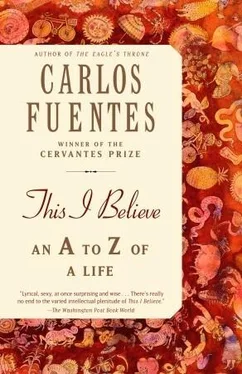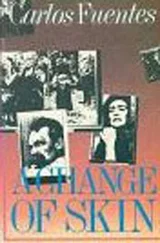The association between the terms “revolution” and “progress” strengthens this futurizable notion. Nevertheless, the utopian element present in all revolution is much more ambivalent. Just as it yearns for a better society, revolution does not think only of the future. Revolution also dreams, perhaps subconsciously, of the past, the Golden Age, the dawn of time. In this sense, revolution could also be considered the restoration of an untainted past. This was, and very notably so, the hope of Emiliano Zapata and his dream of a peasant Arcadia in Mexico.
Nevertheless, the association between “modernity” and “revolution” has been the driving force behind the uprisings in Russia, China, and Cuba. The veil we have drawn over the past has given the past a marvelous opportunity to reappear in disguise. Revolution — whether in Petrograd, Peking, or Havana— ultimately reinforced the oldest designs of power. In Russia, Caesaro-Papism, the unification of temporal and spiritual powers, reemerged in the symbiosis between party and state. In China, the “celestial bureaucracy” of the Middle Kingdom reappeared beneath the authoritarian tunic of Maoism. And in Cuba, Castro has revived the most antiquated traditions of Hispano-Arabic caudillismo, the tyrannical leadership of one political chief.
Perhaps the most coherently “modern” revolutions are those of France and the United States. Nevertheless, when The New York Times asked me which I felt was “the greatest revolution of the millennium,” I was very tempted to leave the realm of politics and consider Copernicus, Einstein, Shakespeare, Cervantes, Joyce, Piero della Francesca, Brunelleschi, Picasso, Beethoven, or Stravinsky, who may well have been greater revolutionaries than Washington or Mirabeau.
But confined to the territory of politics, I can safely state my conviction that the French Revolution was, indeed, the greatest revolution of the millennium, though I cannot help but qualify the response with Winston Churchill’s famous warning that democracy “is the worst form of government except all those others that have been tried from time to time.”
The American Revolution was a colonial uprising against a colonial power. The French Revolution was a social, political, and economic uprising against the ancien régime. It did not have to expel a colonial power. It had to destroy an internal power structure that had been sustained for centuries on the basis of tradition, legitimacy, and the paradoxical marriage between monarchic absolutism and feudal privilege. The French Revolution had to violently destroy the institutions of the ancien régime and replace them with new and perhaps improbable forms of self-determination and civil associations.
Both were violent revolutions. The French Terror sent 16,000 souls to the guillotine — a negligible figure, says Jules Michelet in his History of the French Revolution, if we compare it to the number of executions ordered by the monarchy over the course of 600 years. Nor was violence absent in the American Revolution, which was in fact profuse in its summary executions of those who remained loyal to the British throne. Jefferson and Franklin’s revolution was equally unable to avoid its own brand of terror. The public health committees of the French Revolution had a precedent in the committees of safety, protection, and correspondence that were created to catch and punish the enemies of the American Revolution, or the committee for the detecting and defeating of conspiracies, established by the provincial congress of New York.
But “terror?” The indigenous people of North America— Native Americans — may have suffered more than the French aristocracy.
Both revolutions, the American and the French, confiscated private property. “Notorious conspirators,” “absentists,” “refugees,” and “evaders” were all objects of expropriation in North America. Today they would be aided by a British disposition comparable to the Helms-Burton law.
Both revolutions forced the emigration of countless souls. Comparatively speaking, there were far more émigrés from the United States than France: the masses of boat people who fled the American Revolution in vessels bound for Newfoundland and died during the crossing.
Both revolutions were sullied by the ugly stain of inequality. They proclaimed the universal rights of man, but women were excluded from the list and denied the right to vote. Those without property were also denied suffrage. But whereas the United States had cultivated a middle class of small property owners, the French Revolution had to be far more radical, eliminating the privileges of property, creating a new class of property owners, and establishing the political and legal instruments that such a revolution required.
The extraordinary, truly extraordinary milestone in France, as Michelet notes in his book, is the fact that throughout France people acted spontaneously, and actually anticipated all the revolutionary laws before they were enacted. Michelet calls it “the spontaneous organization of France,” a singular occurrence, on such a grand scale, in the history of humanity. (The Zapatistas’ spontaneous organization of the rural communities of Morelos, in 1915, as described by John Womack, would be another, if slightly more modest example.)
In 1789, despite the aforementioned limitations, almost 5 million French people became voters for the first time and took it upon themselves to form municipal committees whose first task was to replace the monarchy’s impenetrable laws with transparent revolutionary legislation. By 1791, the people of France, advancing ever more rapidly than the revolutionary authorities in Paris, had created throughout the country a total of 1,200 new municipal positions and 100,000 magistrates to impart justice. Such was the impact of this movement that by the spring of 1792, France possessed a completely rehabilitated political and judicial system, an achievement accomplished through direct elections.
Thanks to this truly radical revolution, France established a new property system that became the basis for modern capitalism. The Church and the aristocracy, the remnants of the feudal system, found themselves forced to adhere to the new market system as barriers to free commerce and privilege were abolished, along with the guilds. The free market broadened the horizon of the European economy to an unprecedented degree. The prohibition, however, of the guilds’ freedom of association (the Le Chapelier Law of June 14, 1791) also denied the working class their collective power and protection, and effectively handed them over to the ruthless exploitation of the Industrial Revolution.
Capitalism and democracy are the powerful legacy of the French Revolution, beyond the episodes of revolutionary terror and the contradictions of the Bonapartist interim. Napoleon marched through Europe in the name of revolution but with a bogus crown upon his head. He was defeated in Russia and Spain by patriots who preferred their nationalist shackles to the revolutionary liberties of the French. Nevertheless, Napoleon, by giving Europe its modern civil and mercantile legislation, guaranteed the future of the bourgeoisie that the great Corsican represented on such a heroic, unsustainable scale. And in Germany, it broke the back of the ghettos and liberated the Jews.
The American Revolution did not abolish slavery, the blackest spot in its legacy. A second revolution, led by Lincoln, was necessary to liberate the slaves, and then a third, the civil rights movement, completed the work that still remained to be done in our own times. The United States did not have a Napoleon. Instead, it had a “Manifest destiny” to broaden its borders — at Mexico’s expense — so that it might extend across the continent from the Atlantic to the Pacific. In the United States, an enlightened colonial aristocracy made its presence felt through admirable documents such as the Constitution of Philadelphia, the Bill of Rights, and the Federalist Papers. In France, a frenzied, choleric, intuitive, and fraternal mass of people rose up and, paradoxically, focused its greatest efforts and its most solid laws on liberal development and modern capitalism. But this is a cold definition of the enthusiasm with which William Wordsworth greeted the news from France in 1789, when he affirmed what a marvelous place the world could be when one’s happiness was echoed by millions.
Читать дальше












